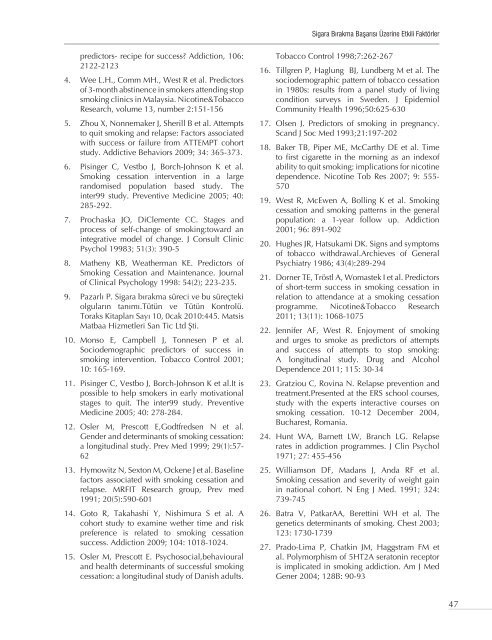Create successful ePaper yourself
Turn your PDF publications into a flip-book with our unique Google optimized e-Paper software.
<strong>Sigara</strong> <strong>Bırakma</strong> Başarısı Üzerine Etkili Faktörler<br />
predictors- recipe for success? Addiction, 106:<br />
2122-2123<br />
4. Wee L.H., Comm MH., West R et al. Predictors<br />
of 3-month abstinence in smokers attending stop<br />
smoking clinics in Malaysia. Nicotine&Tobacco<br />
Research, volume 13, number 2:151-156<br />
5. Zhou X, Nonnemaker J, Sherill B et al. Attempts<br />
to quit smoking and relapse: Factors associated<br />
with success or failure from ATTEMPT cohort<br />
study. Addicti<strong>ve</strong> Behaviors 2009; 34: 365-373.<br />
6. Pisinger C, Vestbo J, Borch-Johnson K et al.<br />
Smoking cessation inter<strong>ve</strong>ntion in a large<br />
randomised population based study. The<br />
inter99 study. Pre<strong>ve</strong>nti<strong>ve</strong> Medicine 2005; 40:<br />
285-292.<br />
7. Prochaska JO, DiClemente CC. Stages and<br />
process of self-change of smoking:toward an<br />
integrati<strong>ve</strong> model of change. J Consult Clinic<br />
Psychol 19983; 51(3): 390-5<br />
8. Matheny KB, Weatherman KE. Predictors of<br />
Smoking Cessation and Maintenance. Journal<br />
of Clinical Psychology 1998: 54(2); 223-235.<br />
9. Pazarlı P. <strong>Sigara</strong> bırakma süreci <strong>ve</strong> bu süreçteki<br />
olguların tanımı.Tütün <strong>ve</strong> Tütün Kontrolü.<br />
Toraks Kitapları Sayı 10, 0cak 2010:445. Matsis<br />
Matbaa Hizmetleri San Tic Ltd Şti.<br />
10. Monso E, Campbell J, Tonnesen P et al.<br />
Sociodemographic predictors of success in<br />
smoking inter<strong>ve</strong>ntion. Tobacco Control 2001;<br />
10: 165-169.<br />
11. Pisinger C, Vestbo J, Borch-Johnson K et al.It is<br />
possible to help smokers in early motivational<br />
stages to quit. The inter99 study. Pre<strong>ve</strong>nti<strong>ve</strong><br />
Medicine 2005; 40: 278-284.<br />
12. Osler M, Prescott E,Godtfredsen N et al.<br />
Gender and determinants of smoking cessation:<br />
a longitudinal study. Prev Med 1999; 29(1):57-<br />
62<br />
13. Hymowitz N, Sexton M, Ockene J et al. Baseline<br />
factors associated with smoking cessation and<br />
relapse. MRFIT Research group, Prev med<br />
1991; 20(5):590-601<br />
14. Goto R, Takahashi Y, Nishimura S et al. A<br />
cohort study to examine wether time and risk<br />
preference is related to smoking cessation<br />
success. Addiction 2009; 104: 1018-1024.<br />
15. Osler M, Prescott E. Psychosocial,behavioural<br />
and health determinants of successful smoking<br />
cessation: a longitudinal study of Danish adults.<br />
Tobacco Control 1998;7:262-267<br />
16. Tillgren P, Haglung BJ, Lundberg M et al. The<br />
sociodemographic pattern of tobacco cessation<br />
in 1980s: results from a panel study of living<br />
condition sur<strong>ve</strong>ys in Sweden. J Epidemiol<br />
Community Health 1996;50:625-630<br />
17. Olsen J. Predictors of smoking in pregnancy.<br />
Scand J Soc Med 1993;21:197-202<br />
18. Baker TB, Piper ME, McCarthy DE et al. Time<br />
to first cigarette in the morning as an indexof<br />
ability to quit smoking: implications for nicotine<br />
dependence. Nicotine Tob Res 2007; 9: 555-<br />
570<br />
19. West R, McEwen A, Bolling K et al. Smoking<br />
cessation and smoking patterns in the general<br />
population: a 1-year follow up. Addiction<br />
2001; 96: 891-902<br />
20. Hughes JR, Hatsukami DK. Signs and symptoms<br />
of tobacco withdrawal.Archie<strong>ve</strong>s of General<br />
Psychiatry 1986; 43(4):289-294<br />
21. Dorner TE, Tröstl A, Womastek I et al. Predictors<br />
of short-term success in smoking cessation in<br />
relation to attendance at a smoking cessation<br />
programme. Nicotine&Tobacco Research<br />
2011; 13(11): 1068-1075<br />
22. Jennifer AF, West R. Enjoyment of smoking<br />
and urges to smoke as predictors of attempts<br />
and success of attempts to stop smoking:<br />
A longitudinal study. Drug and Alcohol<br />
Dependence 2011; 115: 30-34<br />
23. Gratziou C, Rovina N. Relapse pre<strong>ve</strong>ntion and<br />
treatment.Presented at the ERS school courses,<br />
study with the experts interacti<strong>ve</strong> courses on<br />
smoking cessation. 10-12 December 2004,<br />
Bucharest, Romania.<br />
24. Hunt WA, Barnett LW, Branch LG. Relapse<br />
rates in addiction programmes. J Clin Psychol<br />
1971; 27: 455-456<br />
25. Williamson DF, Madans J, Anda RF et al.<br />
Smoking cessation and se<strong>ve</strong>rity of weight gain<br />
in national cohort. N Eng J Med. 1991; 324:<br />
739-745<br />
26. Batra V, PatkarAA, Berettini WH et al. The<br />
genetics determinants of smoking. Chest 2003;<br />
123: 1730-1739<br />
27. Prado-Lima P, Chatkin JM, Haggstram FM et<br />
al. Polymorphism of 5HT2A seratonin receptor<br />
is implicated in smoking addiction. Am J Med<br />
Gener 2004; 128B: 90-93<br />
47

















